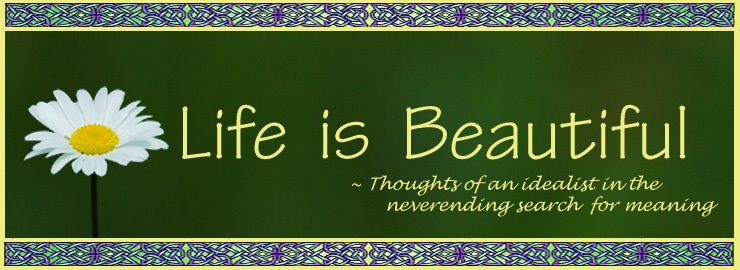
I remember when I was young, maybe 11 or 12, how I used to imagine what my "soulmate" would be like. I used to walk through my day, speaking to him in my mind. I used to pretend that he was just outside the window, and that he could hear my thoughts. Naturally, I imagined that he was responding to my needs perfectly. And I intuitively "knew" that I'd know him when I found him.
For Idealists (members of Keirsey's Idealist temperament, or those with NF in their Myers-Briggs personality type), the soulmate bond is more than having common interests, more than enjoying time spent together, more than a chemical attraction, even more than best friends. A soulmate is one's other half. When together, they create a whole. They are part of each other. Once found and devotion confessed, they would be together forever. With undying commitment. Always keeping each other as first priority. (I'm sure you Idealists are vigorously nodding your heads right about now, while others of you are thinking "whoa! I'd be suffocating"...)
And, I always believed (since girlfriends and movies and books all seemed to provide sufficient evidence) that everyone wanted the same thing from their mate. Right??
Wrong!-- wow-- I had no idea how wrong I was!
The truth is that all personality types (Idealists, Rationals, Guardians, and Artisans) are mostly "self" centered. That is, although we recognize that others have different interests, beliefs, and values, we tend to assume that others basically think the same way we do. If we aren't aware there are other ways of seeing the world, what else can we think, really? For example, don’t we all want to be loved? And, we know what that means, right?
Again, wrong! Let's take a look at Idealist and Rational pairings.
 Idealists seek "soulmates," while Rationals seek "mindmates."* The Idealist soulmate connection is based on a deep spiritual bond, the search for wholeness, and the merging of two individuals. In contrast, the Rational mindmate connection is based on shared interests, the search for truth, and the connection of two independent individuals. For an Idealist, the bond "is" and always will be, because both partners choose it to "be." For a Rational, the connection is only as real as it is objectively present at any given moment. So, for an Idealist the bond is formed at the start. Subsequent positive interactions simply reinforce that they are soulmates, and negative interactions are brushed off as the imperfection of human nature. Whereas, a Rational uses objective observation to determine whether a relationship achieves mindmate status, and subsequent interactions may reinforce or nullify the bond (clearly they allow for everyday rubs, but the overall belief in the bond is more transient.)
Idealists seek "soulmates," while Rationals seek "mindmates."* The Idealist soulmate connection is based on a deep spiritual bond, the search for wholeness, and the merging of two individuals. In contrast, the Rational mindmate connection is based on shared interests, the search for truth, and the connection of two independent individuals. For an Idealist, the bond "is" and always will be, because both partners choose it to "be." For a Rational, the connection is only as real as it is objectively present at any given moment. So, for an Idealist the bond is formed at the start. Subsequent positive interactions simply reinforce that they are soulmates, and negative interactions are brushed off as the imperfection of human nature. Whereas, a Rational uses objective observation to determine whether a relationship achieves mindmate status, and subsequent interactions may reinforce or nullify the bond (clearly they allow for everyday rubs, but the overall belief in the bond is more transient.) So, what happens when an Idealist and a Rational come together?
This is where things get interesting. They have a common preference for abstract language, so communication feels easy. So easy in fact, that I propose that (thanks to self centered thinking) the Idealist believes that he/she has found another Idealist who is remarkably grounded and has figured out how to translate visions into reality (in other words, a super Idealist!) And the Rational believes that he/she has found another Rational who has mastered the uncomfortable realm of emotion (in other words, a super Rational). Interestingly, I found a theory online called the "Grand Miscommunication Theory" (by IgaNoKami). He rather succinctly sums it up as thus (I changed his terminology to match "Rational" and "Idealist"):
It is my theory that within the relationship between the (Rational) and the (Idealist), there is a grand accident that lends itself to compatibility between the two types.And neither is the wiser until the Idealist becomes confused by the Rational's focus on achievement, and the Rational feels uncomfortable with the Idealist's focus on connection. It is then that the two must recognize and accept that their basic fuel for a relationship is different, and that the other will never truly fulfill the concept of mate that each values. In other words, the Idealist is not a mindmate and the Rational is not a soulmate.
The (Rational) is most happy when allowed to rationally examine, explore, and explain his motivations and self-analysis and observation to an intimate partner. This is simply because the (Rational) loves self exploration, loves to gather knowledge and insight into his own actions, not for the sake of emotional discovery, simply out of a sense of curiosity and need to analyze and collect data.
The (Rational) unemotionally and detachedly explains why he or she thinks in a certain way - that is what (Rational)s are best at, observation, particularly of themselves - and the (Idealist) then thinks that they are opening up to them, and becomes moved and emotionally attached to the (Rational). The (Rational) sees that their observations are being received and interesting to the (Idealist), so they continue.
A fascinating relationship between two types. A relationship of total mutual miscommunication, the motivations are completely different, but with a reinforcing result. The (Rational) feels the closeness and intimacy of being able to share their scientific self-analysis, and the (Idealist) feels that the (Rational) is sharing their innermost thoughts, feelings, and emotions, and so the cycle of miscommunication keeps them locked together in a positively reenforcing relationship.
So, does that mean we should mate with someone of our own temperament? Not necessarily. Most often, it is our differences that attract us to another. For good reason. Each personality type has strengths and weaknesses. One's strengths can complement the other's weakness. It is easy to see how "self" centered thinking would lead to confusion and misunderstanding between the two mates.
 Some lucky couples do find an amazingly compatible mate to share their life with. But for the majority of us, once the romantic love phase of a new relationship fades, we start to experience rubs. And then we start launching our own Pygmalion Projects, each attempting to reform the other into a person more like ourself. Since, naturally, we all believe that our aim in life is the most valuable for everybody. But, as Keirsey points out, others cannot adopt our goals without violating their own character. The key to success, I believe, is maturity, a willingness to learn how others think, and a willingness to embrace others' values as equally valid as our own.
Some lucky couples do find an amazingly compatible mate to share their life with. But for the majority of us, once the romantic love phase of a new relationship fades, we start to experience rubs. And then we start launching our own Pygmalion Projects, each attempting to reform the other into a person more like ourself. Since, naturally, we all believe that our aim in life is the most valuable for everybody. But, as Keirsey points out, others cannot adopt our goals without violating their own character. The key to success, I believe, is maturity, a willingness to learn how others think, and a willingness to embrace others' values as equally valid as our own.Personality theory experts tell us that any type pairing can be successful. Certainly, any two mature, well adjusted adults can learn to meet each others' needs and make a marriage work. But interestingly, studies have shown that there is a pattern to mating. Keirsey spent 40 years "people watching," and he has documented clear patterns in mating. By far, the most common marriage is between an Artisan and a Guardian. Not surprising, given that Artisans (SPs) and Guardians (SJs) comprise 85% of the population (according to Keirsey). And, though it's difficult for the relatively rare Rationals (NTs) and Idealists (NFs) to find each other, there is a significant frequency of Rational-Idealist marriages. I won't get into the explanation here, but Keirsey has a clear theory about why these pairings occur. It has to do with the preference for abstract vs. concrete use of language (N vs. S), and the preference for using tools in a cooperative manner to pursue goals (SJs and NFs) vs. using tools in a utilitarian (or most effective) manner to pursue goals (SPs and NTs.)
So whether your spouse is an Artisan searching for a playmate, a Guardian searching for a helpmate, an Idealist searching for a soulmate, or a Rational searching for a mindmate, any pairing can be successful. And learning how another sees the world can be a wonderful, lifelong, grand adventure!
(*Guardians seek "helpmates," and Artisans seek "playmates.")


